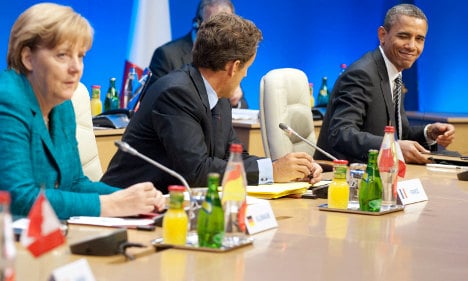It’s a thoroughly shameful situation. It’s the precipitous decline of an important nation, a nation that is regressing back to a time when it was a passive player in global affairs.
It’s a self-inflicted relegation from the ranks of the world players to the status of spectator and heckler. And we have to ask ourselves just how this could happen in less than a year and a half.
Germany is by far the most important economic power in the European Union. The EU would be unthinkable without its German engine, just as the euro debt crisis cannot be resolved without active German involvement.
Berlin wants a permanent seat on the United Nations Security Council and German soldiers fight alongside those of other NATO countries in the struggle against international terrorism in Afghanistan.
But these facts and goals have little to do with Germany’s current standing in the European Union and on the global stage. In the orchestra of great powers, Berlin has not had an instrument to play for months. Paris and London are making the music and giving the cues.
This country, represented by its government, has become a bystander to world politics while others show the way. How long has it been since Berlin had something to say and others actually listened? Former Chancellor Gerhard Schröder – and even Angela Merkel – once commanded attention, if not always deference, from Germany’s partners.
So what happened? After all, this is still the same chancellor who until 2009 was brilliantly keeping the consequences of the world economic crisis in check, at the helm of a grand coalition between her conservatives and the centre-left Social Democratic Party (SPD).
This is the same Angela Merkel who set the agenda at the G8 summit in Heiligendamm, and was celebrated in the international press as a shrewd world leader.
And now? The old World War II allies of France, Britain and the United States have taken action against Libya and made clear the West supports the democracy movements in the Arab world. This troika has gone on the offensive by actively taking responsibility while Germany stands on the sidelines and recites its reservations.
At the G8 summit in Deauville, France last week, Merkel was a shadow of the stateswoman seen on the Baltic coast in 2007 – just as the country she represents has become a shadow of its former self.
Germany appears content to navel gaze. The government boasts about the booming economy, but in reality it’s fretting over whether it can afford to bail out Greece. Of course, the Greeks have to tighten their belts so they can buy the German submarines that Berlin has talked Athens into buying – even though almost everything else should be higher on the list of Greece’s priorities.
It’s difficult to believe that this German decline is just down to Merkel’s junior coalition party, the pro-business Free Democratic Party, which seems more concerned with its own image rather than Germany’s standing globally.
Perhaps the chancellor simply lacks the courage to say out loud that Germany has responsibilities in Europe and the world? That the nation cannot shirk its duties and simply disengage from global affairs?
It’s not enough to let Foreign Minister Guido Westerwelle and Defence Minister Thomas de Maizière set foreign policy as they please. Angela Merkel has to show leadership and determine where Germany’s interests in the EU and at the UN lie. She can no longer afford to sit on the sidelines.
This commentary was published with the kind permission of Berlin newspaper Der Tagesspiegel, where it originally appeared in German. Translation by The Local.




 Please whitelist us to continue reading.
Please whitelist us to continue reading.
Member comments